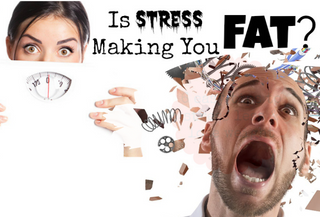How Stress Affects Your Health & How to Counter It

Feeling bad about something? This article may make you feel worse.
Did that sentence cause your heart rate to speed up just a little? That’s stress. And it is one of the root causes of insulin resistance—the condition that leads to diabetes, BP, heart problems, and a myriad other conditions.
But don’t worry, we have a solution!
If that sentence caused your pulse to quicken a bit—that’s stress too! But the good kind.In this post, we will take a look at how stress can trigger diabetes, BP, heart problems, obesity, etc. and ways to address it
- Good stress vs bad stress

All stress isn’t bad. Good news—a promotion, a winning lottery ticket, the feeling just before a big game—causes your hormones to spike and your pulse to quicken, although there is no fear or anger. This is good stress. It inspires and motivates; pushes performance; focuses energy.
On the other hand, stress that wears you down makes you anxious, depressed, distressed, drains energy, or decreases performance, is bad. Bad stress isn’t always chronic; it often only lasts for a short time.
Such short-term stress doesn’t last long, and you can find ways to dissipate it quickly. However, when stress becomes chronic, it takes a heavy toll on your body and can result in diverse health problems.
It can cause headaches, sleep problems, digesting problems; it can lead to obesity, and lifestyle disorders, like, diabetes and blood pressure.
- Stress and diabetes

There are seven key causes of type two diabetes: four relate to diet, two to exercise and one is stress-related.
(for a deeper dive into the key causes of insulin resistance you can watch our video on this topic, here).
If you measure your blood sugar levels when you are depressed, angry, or worried, you will notice a sharp spike in your readings. This is the effect of stress. And it is caused by a hormone called cortisol.
To understand why stress causes BSL to rise, we must understand the function of cortisol, aka, the stress hormone. Cortisol is what kept our ancestors alive and safe long ago, kept them aware, and gave them the energy to fight or flee, as the situation demanded. What happens is this:
when your body is under stress, the adrenal gland releases cortisol directly into the bloodstream. It creates a condition called glucogenesis that leads the liver to secrete glucose into the bloodstream. It elevates your heart rate and forces blood to be pumped harder/faster.
It does one more thing: it lowers or stops insulin production, so glucose can be used immediately rather than be stored. Once the situation is resolved, hormones return to normal, heart rate slows down and BSL comes down too.
We may not live in the jungle anymore, but everyday situations can be just as stressful. Car not starting, work piling up, financial woes, arguments with your spouse or co-workers or boss. These are everyday situations that we all experience.
Every day. And they can cause our bodies to release cortisol right through the day, leading to constantly elevated blood sugar levels and high heart rates.
Since the primary function of cortisol is to stop or slow down the functioning of insulin, it, in effect, renders cells insulin resistant. Now if cortisol remains elevated, the body too remains insulin-resistant.
This pushes demand for insulin; the pancreas struggles to keep up and blood glucose levels stay elevated… cells are unable to get the glucose they need and this ultimately leads to diabetes type 2
- Stress and weight gain
The primary cortisol-fat gain connection goes back to high blood glucose and suppressed insulin.
These two effects lead to cells being starved of glucose. But those cells still need energy and so they send hunger signals to the brain—leading to overeating.
Some studies have also found a connection between cortisol levels and cravings in some populations.
An increase in appetite means more food will be consumed, and ultimately excess glucose being converted and stored as fat.
- Stress and Gastrointestinal Problems

We have two nervous systems in the body sympathetic and parasympathetic. Cortisol triggers the sympathetic nervous system causing the body to respond with elevated heart rate, lower insulin, etc. as we have seen.
Now both the systems cannot function simultaneously, and so the parasympathetic nervous system is suppressed. The parasympathetic nervous system is activated during eating, as enzymes & hormones controlling digestion need to be performing at peak level for the body to be able to use food energy optimally.
Thus, when food is consumed in a body flooded with cortisol, digestion and absorption do not occur optimally, triggering indigestion and inflaming the mucosal lining of the digestive tract. This ultimately leads to problems like irritable bowel syndrome (IBS), colitis, and even bowel cancer.
- Stress and heart disease

In a fight-or-flight situation, the body needs an enhanced flow of oxygenated blood, and that’s what cortisol does: it constricts blood vessels and increases blood pressure.
However, if cortisol levels remain high, it leads to damage of blood vessels and narrowing of arteries: the ideal condition for a heart attack. Turns out the stereotype of Type A personalities having heart attacks is actually true!
Now For The Good News!
It’s not all doom and gloom, however. We can control and reverse the effects of stress and regulate cortisol levels. There are two ways to do this:
1) By mastering stress management
2) By optimizing diet.
Stress Management
There are plenty of ways to de-stress. Some techniques are just plain common sense: Get sufficient, and good quality sleep, exercise regularly, breathe deeply.
Meditation is a proven technique to lower stress levels, and it requires nothing more than a quiet corner and some alone time. There are many different forms of meditation—mindfulness, focused, spiritual, mantra, transcendental, etc.—and they are all effective.
Try them all; find the one that suits you best and stick with it.
Controlling stress through diet
As we saw, sustained inflammation elevates cortisol, so it follows that if inflammation is reduced, cortisol levels will drop. It must be noted that there is no one-size-fits-all anti-inflammatory diet, but there are some key nutritive rules that you can follow:
- Stick to a log GI diet
- Avoid fatty and fried foods
- Reduce or eliminate caffeine
- stay away from alcohol, or reduce consumption
- Eat whole plant foods—that maximize micro-nutrients fiber, antioxidants, fruits, nuts, beans, seeds
- Eat slowly and mindfully—i.e. don’t watch TV, or scroll through your Social Media Feeds, while eating…that includes FFD’s channels :)
(For an easy solution to getting the micro-nutrients and antioxidants you need, read our post: Super Green Smoothie, here)
Conclusion
In the end stress, through its associated cortisol, has a role to play in keeping us healthy. Like everything else in life, it is only good in moderation. Sustained, elevated levels of cortisol lead to myriad health disorders.
But we can learn to reduce and control stress, and thus cortisol, through stress release techniques like meditation, diet, and exercise.
For more information on stress, release subscribe to our youtube channel and follow our weekly program Stay Positive


